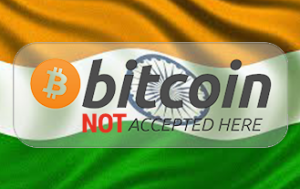Bitcoin In India: Legal Status And How It Affects Bitcoin Users

On April 20th, the Indian government will declare its position on the legal status of bitcoin in the country. An “inter-ministerial committee” created by the Indian Parliament will give its answer in two weeks, according to a report published by Money Control. An unknown official quoted in the report said: “There will be more discussions; a verdict will be declared soon on the legality of the cryptocurrency in India”.
At the moment bitcoin in India is not considered to be illegal under current legal provisions. The decision on April 20th could change everything. Some politicians are demanding that bitcoin be declared illegal in India. If bitcoin is declared illegal, it will have an immediate impact on the burgeoning cryptocurrency ecosystem in this country, which got a boost from demonetization a few months ago.
The Bitcoin and Blockchain Ecosystem in India
This ecosystem can develop into a great center for blockchain innovation if the government lets it flourish. In the meantime, actors within this cryptocurrency ecosystem have dealt with lack of regulation and other challenges. Bitcoin advocates and other specialists created the so-called “Digital Asset and Blockchain Foundation of India” (DABFI) with the main goal of educating authorities about Bitcoin and digital currencies. This is one of the first challenges that the bitcoin and cryptocurrency community set out to solve. Unfortunately, DABFI didn’t get an official response until now, prompting further speculation.
The government is not the only entity that has failed to embrace bitcoin and cryptocurrency advocates. In February, the CEO of the most important Indian exchange – UnoCoin – Sathvik Vishwanath, said that the Reserve Bank of India (RBI) made no efforts to work with the Indian exchanges and explore regulatory options for the bitcoin industry. This is a discouraging sign that is indicative of the environment that the bitcoin and cryptocurrency industry faces in India.
Bitcoin Users in India
Despite the negative environment, the bitcoin user base is growing in the country. According to an article published on March 2017 on the India Today magazine, the bitcoin user base in India rose by 250% since the demonetization of 86% of currency happened back in November 2016. As the user base grows, the issue becomes more important. As of now, Indian users can buy, sell and mine bitcoin and other digital currencies. However, if they are victims of cyber criminals or fraud and their cryptocurrency gets stolen, the Indian government will not help them, as per a recent article by the Daily Mail.
Petition to Declare Bitcoin Legal in India
The bitcoin and cryptocurrency community in India, is not giving up on this crucial issue. A few days ago, local bitcoin industry advocates created a petition on Change.org asking Indian lawmakers and officials to declare bitcoin and digital currencies legal. According to the petition, “India [could] save US$ 7 billion by using cryptocurrencies for inward remittances.” These savings could be used to fuel other projects. The petition for example compares the saving with the “US$ 2 billion budget of the Mid Day Meal scheme to feed 120 million poor children”. This petition garnered over 10,000 signatures in less than a week, showing that there is substantial support for bitcoin and other cryptocurrencies in India.
Final Thoughts
There is no doubt that India has a lot to lose if the government declares bitcoin and other cryptocurrencies illegal. Hopefully the efforts of local advocates will bear fruit. If so, India will be able to enjoy the advantages of a burgeoning bitcoin industry. The citizens will also be able to get the right kind of support from the authorities when others commit cyber-crime and steal their digital assets. Legalizing bitcoin will also help the government understand how cryptocurrencies work and will allow them to allocate resources to fight money laundering and other financial crimes. On the other hand, if the Indian government chooses to make bitcoin illegal, it runs the risk of pushing the industry underground and encouraging more crime.







